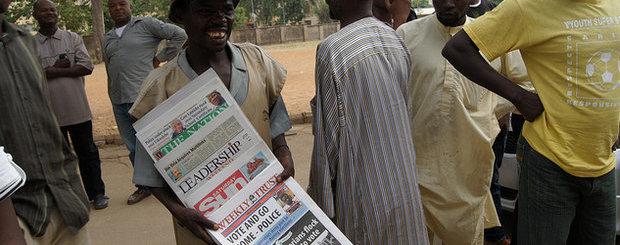Liberia: Children in the Fight Against Corruption – By Robtel Neajai Pailey

 MONROVIA, Liberia – I remember the first time I stared corruption in the face.
MONROVIA, Liberia – I remember the first time I stared corruption in the face.
It was 2010, and I was chairwoman of a Liberian government committee responsible for reforming the awarding of international scholarships. We discovered that a group of 18-year-old boys had forged their national exam records to become eligible for a scholarship to Morocco.
I wasn’t surprised; fraud has become a national pastime in Liberia. If you’re ethical and upright, you’re called stupid. If you’re ruthless, greedy and cunning, you get praised as a national hero.
In her 2006 inaugural address, President Ellen Johnson Sirleaf vowed to make corruption public enemy number one, despite the country’s long history of patronage and graft. Seven years on, corruption remains in full public view and has yet to be stamped out.
This month, the country’s auditor general was dismissed for using his private company to get a government contract. And earlier this year, a member of the House of Representatives was caught on tape allegedly soliciting a bribe, yet he remains in office.
In the last 10 years, Liberia has received billions of dollars in international aid, but questions are starting to be asked about how those donor dollars are spent. Last month, $13 million from the European Union for health-related projects reportedly went missing before resurfacing. While maternal mortality remains high, government officials are squabbling over who should get the lion’s share of the country’s meager $553 million budget.
The only way corruption will be rooted out here and elsewhere in Africa is if we teach our children to recognize it, reject it and condemn and shame their elders.
When we invited the 18-year-olds who had forged their records to a meeting to coax them into confessing, they initially sat stone-faced, in their pristine white shirts and pleated pants. Then one of them cracked.
“Yes, it was me. I did it,” he said. But more disturbing than the act of cheating was the fact that these young men believed they had done nothing wrong “” that falsifying documents was a legitimate exercise as long as you didn’t get caught. They were simply parroting the kind of corruption they’ve seen in school, government and the private sector.
Here, corruption is enmeshed in daily human interaction; it is a function of both poverty and greed. Journalists take bribes because media salaries are virtually nonexistent; businesses sell substandard goods with impunity; squatters auction off land that doesn’t belong to them; and university students pay professors to manipulate their grades.
The government sits on top of all this mischief, unable “” and in some ways unwilling “” to change a system that often benefits the rich and powerful.
One could argue that Liberia’s very foundation is built on theft and dispossession. The country was “founded” in 1847 by repatriated slaves from the United States who in turn disenfranchised indigenous populations for over a century. But I refuse to believe that our inability “” or reluctance “” to overcome corruption is only a function of history.
Governance gurus and donors often argue that building institutions in fragile states like Liberia will weed out corruption. But institutions are not one-size-fits-all, foolproof structures for curbing human vice. If individuals are corrupt, then the institutions they represent, no matter how strong, can also be corrupted.
The real challenge lies in straightening a severely crooked ethical order. And we can’t afford to wait until someone is 18 to demand that he or she miraculously develops scruples. The adults, mired in a culture of endemic corruption, are unyielding. It’s the children who must lead Liberia’s moral revolution.
Our children have been born into a country recovering from war, where people are openly questioning the status quo more than ever before. They also have the uncanny ability to imagine alternative ways of doing things. And they are at the critical stage in their development when it is easy to challenge old values and instill new ones.
But first, we have to arm them with the right tools. Children gravitate to audio and visual stimuli, so anyone rallying them against corruption must employ radio dramas, popular songs, games and storybooks.
I wrote “Gbagba,” an anti-corruption primer for kids, to teach them about values and ethics. But instead of employing spiders or rabbits, Gbagba has human characters, with contemporary scenarios that children can relate to.
The project was conceived out of my own frustrations in returning to Liberia, where, after many years living abroad, I found an inverted social order, where wrong appears right, and right offers few benefits. During Liberia’s civil war, those who survived did so by both fair and foul means. During peace, we are struggling to discern the thin line between fair and foul, and floundering in the process.
But the books won’t work for everyone. Like most places around the world with low literacy rates, radio is an important means of communicating and mobilizing here. Radio dramas, songs and games for children must be the starting point for a national dialogue on ethics that no outsider could manufacture.
Liberia’s children “” and kids throughout Africa “” are an untapped arsenal in the war against corruption that we have ignored for much too long.
But only if we teach them that corruption is not inevitable will children begin to shame adults into doing the right thing.
Robtel Neajai Pailey is a columnist for New Narratives, a Liberian news Web site, and a doctoral candidate in development studies at the School of Oriental and African Studies, University of London.
This piece was previously published by the International Herald Tribune.







If one wants to argue that Liberia was built on a history of corruption, then the same should apply to all of Africa. Basically all modern African nations are a product of European colonialism, which exercised the same fundamental restrictions on citizenship as the Americo-Liberians. I see no special reason to call them out.
I totally loved your outlook -i am returning to Liberia in the next few weeks to invest a few weeks of my time to document how and if Liberia is able to be capable of doing business with . Handouts are not needed but hand-ups and only through simple hard work and honesty can things become improved -i am documenting my journey on http://www.liberiantravel.com and would encourage anyone with stories to share to write their story on the guest page